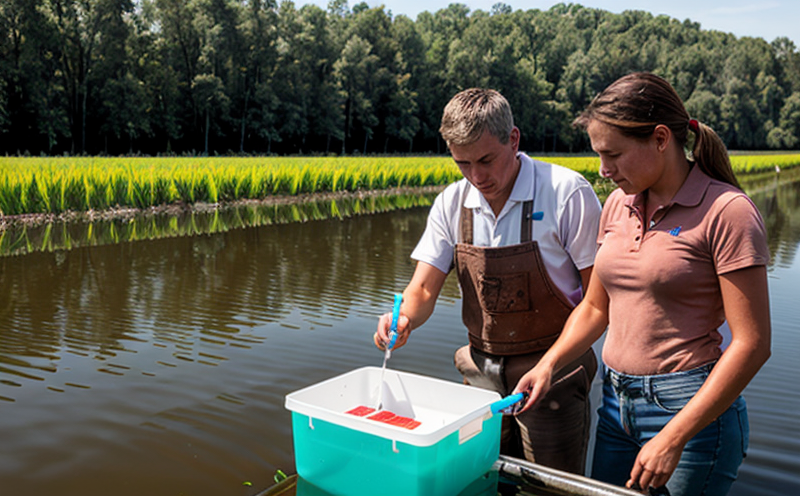Salinity Testing in Irrigation Water
Salinity testing in irrigation water is a critical component of agricultural quality management and compliance. Salinity can significantly impact crop productivity, soil health, and the overall sustainability of agricultural operations. For crops to thrive, irrigation water must be within an optimal range of salinity levels, which varies depending on the specific type of plant being cultivated. Excessively salty water can lead to osmotic stress, reduced nutrient uptake, and even crop death. Therefore, monitoring and maintaining acceptable salinity levels is essential.
The importance of this service cannot be overstated in sectors such as agriculture and forestry, where water quality plays a pivotal role in ensuring sustainable practices. The testing process involves several key steps: specimen preparation, instrumentation calibration, sample analysis, and result interpretation. This service ensures that the irrigation water meets specific acceptance criteria set by international standards.
Salinity is typically measured in terms of electrical conductivity (EC) or total dissolved solids (TDS). EC provides a direct measure of salinity levels, while TDS gives an indication of the total concentration of dissolved salts. Both methods are widely accepted and used globally to assess water quality for agricultural purposes.
The testing process begins with the collection of representative samples from various points in the irrigation system. These samples are then carefully prepared according to standardized procedures to ensure accuracy and reliability of results. Once prepared, the samples undergo rigorous analysis using advanced equipment such as conductivity meters or ion chromatographs. The results obtained are compared against established benchmarks to determine compliance with relevant standards.
It is crucial that these tests are conducted regularly throughout the growing season to account for fluctuations in salinity levels due to various factors like rainfall, evaporation rates, and climate conditions. Regular monitoring allows farmers and quality managers to make informed decisions regarding irrigation practices and adjustments needed to maintain optimal water quality.
The application of this service extends beyond mere compliance; it also supports broader sustainability goals by promoting efficient use of resources and minimizing environmental impact. By ensuring that irrigation water is suitable for its intended purpose, we contribute to healthier ecosystems and more resilient agricultural systems capable of withstanding future challenges posed by climate change and increasing global demand.
Understanding the nuances involved in salinity testing helps stakeholders appreciate how integral this service is to achieving success in agriculture and forestry. With precise measurements and consistent monitoring, farmers can optimize their practices leading to better yields and improved long-term outcomes for both themselves and the environment.
Applied Standards
| Standard | Description |
|---|---|
| ISO 8493:1996 | Determination of total dissolved solids in water by gravimetric method. |
| ASTM D510-17e1 | Standard test methods for determination of electrical conductivity and resistivity of water at 25°C (77°F). |
| EN ISO 7893:2016 | Water analysis - Determination of total dissolved solids by ion chromatography. |
| IEC 62492-2:2015 | Determination of electrical conductivity in water for the purpose of assessing the quality of irrigation water. |
Eurolab Advantages
At Eurolab, we offer unparalleled expertise and advanced facilities dedicated to providing accurate salinity testing services tailored specifically towards agricultural applications. Our team comprises highly qualified professionals with extensive experience in fielding complex analytical challenges related to water quality assessment.
We employ state-of-the-art instrumentation capable of delivering precise measurements across a wide range of salinity levels, ensuring reliable data that can be trusted by decision-makers at all levels within the industry. In addition to our technical capabilities, we also provide comprehensive support services including training programs designed to enhance understanding among personnel responsible for implementing best practices regarding irrigation water management.
Our commitment to excellence is reflected not only in our methodologies but also in our unwavering dedication towards sustainability and continuous improvement of our processes. By leveraging cutting-edge technology combined with rigorous adherence to international standards, Eurolab ensures that every test conducted contributes positively towards achieving sustainable agricultural practices around the world.
Quality and Reliability Assurance
The quality and reliability of Eurolab's salinity testing services are guaranteed through strict adherence to recognized international standards. Our laboratories follow ISO/IEC 17025 accreditation requirements, which ensure that all analytical procedures comply with stringent criteria for accuracy, precision, and repeatability.
Our methodologies are regularly validated against reference methods specified by organizations such as ASTM and EN ISO, ensuring consistent performance across different laboratory environments. This commitment to quality extends beyond just the technical aspects; it also encompasses robust quality management systems that oversee every aspect of our operations from sample receipt through final report generation.
To further enhance reliability, Eurolab maintains an active involvement in proficiency testing programs organized by recognized bodies like AATCC (American Association Textile Chemists and Colorists) and others. Participation in these schemes provides independent verification of our analytical capabilities and reinforces confidence among clients that they are receiving accurate results consistently.
In summary, the combination of advanced instrumentation, experienced personnel, robust quality assurance measures, and continuous improvement efforts makes Eurolab the premier choice for salinity testing services aimed at supporting sustainable agricultural practices globally.





